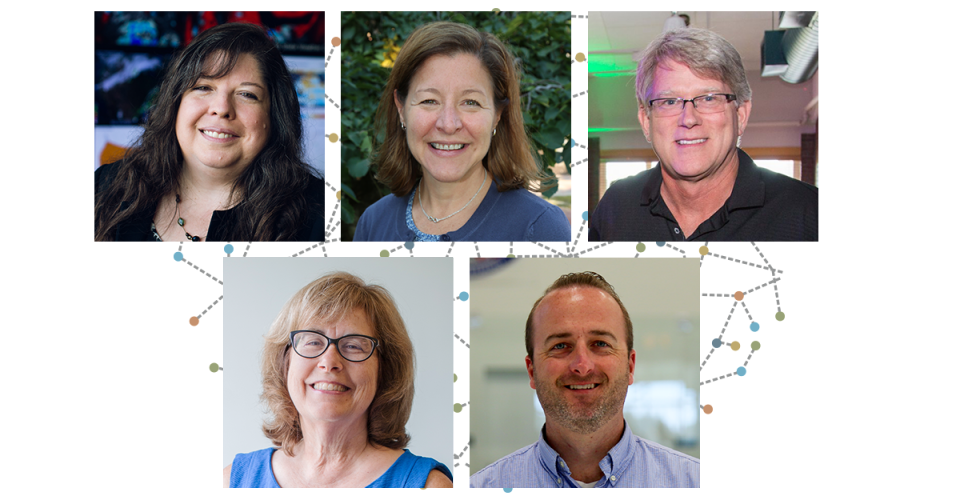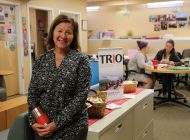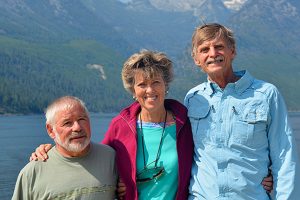Five who are making a difference
Lourdes Avilés
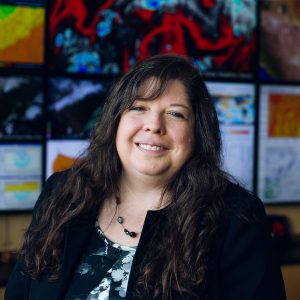
Meteorology Professor Lourdes Avilés is a mentor to students, professional colleagues, female counterparts, fellow Latinas, and budding scientific authors, but she doesn’t advertise herself as such. “I have never thought of myself as a mentor or in a mentoring role,” she says. “I just do what I feel is right. I sense the needs of people interacting with me.”
Research is emphasized in her field, and she advises both undergraduate and graduate students. “I have grown in my ability to help students be better scientists, and adjust to their needs,” Avilés says. “Some have very strong ideas and intuition about which ways to go. Others are more timid or have never had the opportunity to make their own decisions.”
Students seek her out to navigate University matters: young women ask about work-life issues; and junior meteorologists look for professional pointers. The author of Taken by Storm, 1938: A Social and Meteorological History of the Great New England Hurricane, Avilés is currently working on books on atmospheric optics and Caribbean hurricanes, and graciously shares writing and publishing tips. All of this mentoring is unsolicited. “I’m surprised how much I’ve served in that role without even thinking of it,” she says.
Her campus collaborations include co-writing “Stormy Weather,” a play/vacation camp for elementary students. Avilés, the production’s science consultant, worked with education, theatre, and meteorology students, and only in retrospect did she recognize the mentorship aspect of her contribution.
Her willingness to help and modesty have made her an excellent fit on PSU’s campus, where she noticed “something different” when she came to interview in 2004. “There is a collegiality and a friendliness, and an urge to do interesting and important things and care for our students,” she says. “In the back of everything we do we’re always thinking: How can we do better for our students? This is a positive place to work, and to work with others.”
Terry Reddington ’80
After earning his business management degree from Plymouth State, Terrence “Terry” Reddington embarked on a highly successful, ongoing career, progressing from operations management to manufacturing electronics and technology. Through work in sales, presales, product development, artificial intelligence, and more, he’s evolved over decades of change by focusing on staying relevant. “I’ve done my best to remain that way with the technology and the people I interact with as clients,” he says.
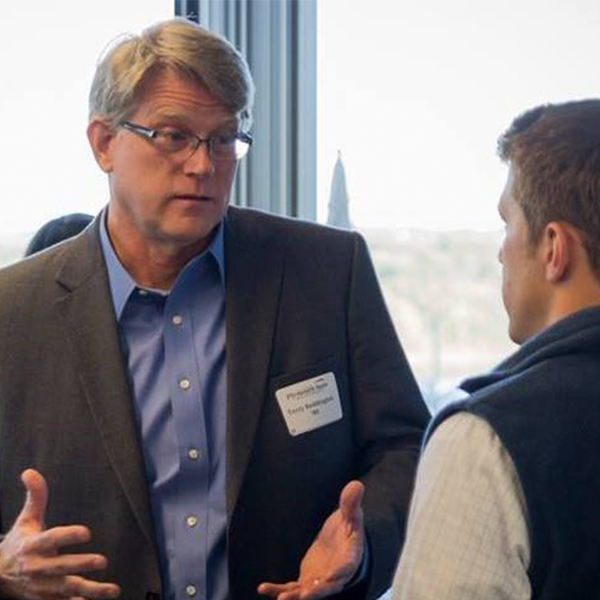
Reddington’s professional mentoring perspective has been finely tuned through experience with corporate mentoring programs at KPMG and SAP. The latter’s sales graduate program led to a connection with Professor Robert Nadeau, who directs the University’s Professional Sales Program.
Reddington’s extensive background is paired with an abiding interest in PSU and its students. “My experiences at PSU were so great, and I look back on them very fondly,” he says. He volunteered for PSU’s alumni mentoring programs in 2015 and 2016, helping one student negotiate job offers and another set up her LinkedIn profile. He stays in touch with students via the social media platform and continues to generously share advice.
“Students who are just starting out may not have much experience to rely on but, as they gain confidence, they see that things don’t have to be so daunting,” he says. He encourages students to get involved in activities, and not just for the networking aspect. “When you learn to do things, you’ll have confidence when you encounter them again.”
Reddington views building confidence as fundamental to mentoring. “I find myself in corporate America and around the world and I’m sitting right next to people who went to more prestigious schools. You make your own way. Confidence and how you feel about yourself are so important. It doesn’t matter where you’re from; it just depends on how you apply yourself.”
Bonnie Bechard

Superior skills and knowledge are valuable, but Professor Bonnie Bechard believes that great mentors also possess intrinsic qualities. “Learn to lead from the heart and the mind,” she counsels. “You need to teach from the heart first, then you can mentor. Students have to first know that you care about them.”
Bechard, recipient of the PSU Distinguished Graduate Teaching Award and the Alumni Association Faculty Award of Excellence, has taught for over 35 years. She continually refreshes her pedagogy—and the University’s repertoire of business-related opportunities—through new programs, including the entrepreneurial student group, Enactus (now in its fifth year), and the Panther Pitch (beginning its third). (See Panther Pitch story, page 16.)
Both programs represent new mentoring venues for Bechard and regional business leaders, and align with her advocacy for experiential learning through work on real-life projects. “That’s the beauty of both mentoring and Cluster projects,” she says. “Neither can happen entirely inside the classroom.”
Her spring Social Entrepreneurship special topics course demonstrated that Bechard’s time-honored mentoring strategy remains on point. The course’s “Climb Above Addiction” project was devoted to addressing the opioid crisis, and several students revealed in an early planning meeting that they had lost someone to overdose.
“A cousin, an uncle, and a friend—all of these connections in this little room on campus,” Bechard recalls. “Mentoring also has to take into consideration what matters most to students.”
The event raised awareness and funds to combat the crisis by allowing participants to experience adventure therapy through rock climbing and hiking, with proceeds benefiting a local recovery retreat center. It also gave students a needed outlet to tackle something as big as addiction.
“They were involved in something that was meaningful and wouldn’t be forgotten,” says Bechard. “They developed and used skills that they didn’t know they had and made a difference.”
Patti May
Patti May, director of TRIO, has a professional view of the University’s strong mentoring culture. A staff member since 2003, she oversees a peer mentoring program that teaches mentorship skills and fosters mentor relationships for students who are either first-generation, low-income, or have a disability. These three factors affect more than half of all PSU students.
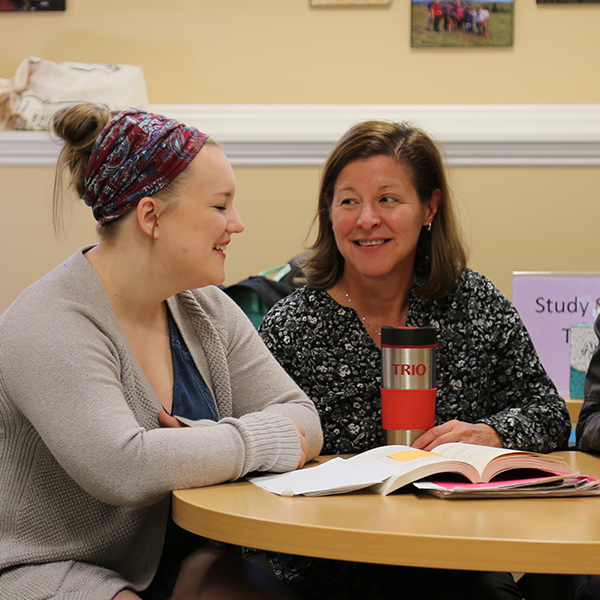
“We really have a unique situation at Plymouth,” says May. “People believe in TRIO, and we have close working relationships with Financial Aid, Information Technology, and other offices that are important to students. It’s a seamless operation.”
Sixty students paired in the fall with 30 student mentors, and they bonded through a week’s worth of “Connection Days” before classes began. “We try to match them up by their areas of study, such as biology to biology,” says May. “This gives students an immediate anchor to rely on.”
Students, who might not have previously known what the Registrar does, learn about campus programs, offices, and buildings, and mentors are trained in conflict resolution and other useful skills.
May gets special satisfaction from mentor relationships that benefit both parties. She recalls a student who had been very shy and didn’t think he belonged in college, and would quickly pass her in hallways without making eye contact. His mentor was also somewhat hesitant in taking on her role, but grew in confidence through work with TRIO’s educational coordinators. In turn, the student mentor made a strong connection with the shy student, who stayed in school, flourished, and has become a mentor himself. He now makes eye contact easily and wins smiles in return.
“TRIO is truly a team effort, and we see our role as an umbrella connection to the University, faculty, and campus resources,” says May. “We have strong support from the University at the highest level and the resources on campus to make it work.”
Craig Russell ’04
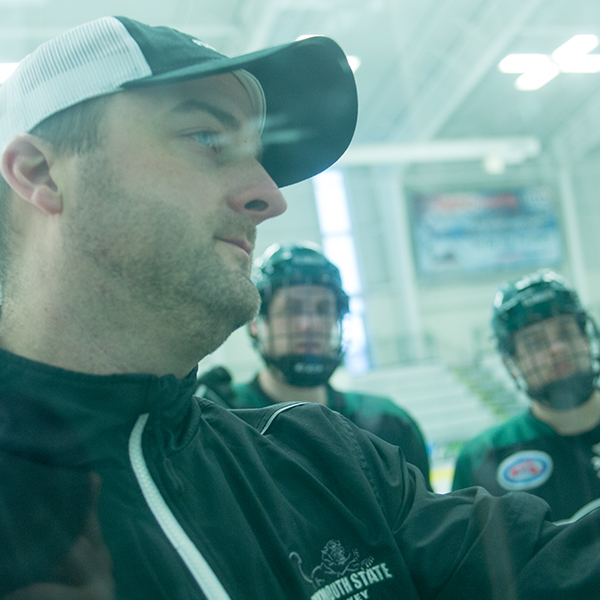
Craig Russell is in his ninth year as Plymouth State University’s ice hockey coach after serving as assistant coach for seven years. He also played on the team. The sport has profoundly shaped him, but he downplays its importance in light of life’s more lasting lessons.
“A lot of what we do is centered on leadership and giving back, and it’s so much less about hockey,” he explains. “Hockey is the easiest part of an athlete’s day. The more important job for me as a mentor is shaping a culture of contributors. We talk about Ut Prosim and the emphasis on service. We try to give more than we receive, and we receive so much.”
PSU hockey players are enthusiastically supported by fans in the community and on campus. “If they get breakfast at Chase Street, someone will grab them and talk their ear off,” says Russell. “We are so fortunate to have that about our program, and to have people who want to get to know us. We should get to know them too.”
Inviting fans and their kids down to the locker room and celebrating the successes of other athletes are among the many ways that Russell’s team reciprocates. The team works with local nonprofit Voices Against Violence to combat domestic violence, and the “Good Deed Challenge” has players devising community assistance projects. Teammates have unloaded trucks for thrift stores, gathered trash, raked lawns, and delivered food.
The “Team IMPACT” initiative involves a local child recovering from cancer who regularly comes to practices and games. “He puts so much into perspective for our group,” says Russell. Children with health concerns are also the focus of the holiday season “Teddy Bear Toss,” through which the men’s and women’s ice hockey programs team up with the Children’s Hospital at Dartmouth (CHaD) to collect and distribute stuffed animals for children undergoing treatment.
Coaches sometimes have to redirect athletes, such as when Russell benched a talented player with a poor attitude. “He needed a reality check. Over time, he learned what it was to be part of a team. Because he focused on being a better person, hockey became easier for him.”
The student thanked Russell when he graduated and has gone on to career success. Russell can easily list other alumni of his program who have achieved great things in law school, corporate life, public service, and entrepreneurial pursuits. It’s their commitment to serving others and giving back, however, that he considers the greater accomplishment.
■ Peter Lee Miller
From the top: Lourdes Avilés, John Tully photo; Patti May, Ian Halter photo; Terry Reddington ’80; Bonnie Bechard, John Tully photo; Craig Russell ’04, Mackenzie Fullerton ’17 photo.
Tags: Bonnie Bechard Craig Russell Lourdes Aviles Patti May Terry Reddington





